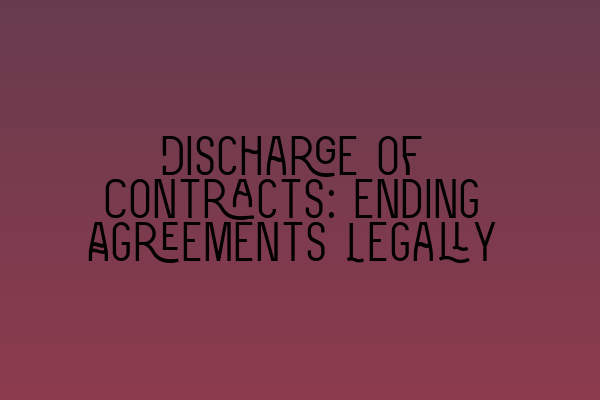Discharge of Contracts: Ending Agreements Legally
Contracts are the backbone of the legal world. They govern the relationships and obligations between parties and provide a framework for business transactions and personal arrangements. However, not all contracts are meant to last forever. There may come a time when a contract needs to be discharged or ended to release the parties from their obligations.
In this article, we will explore the various methods of discharging contracts and the legal considerations involved. Whether you are a solicitor, law student, or just someone seeking a better understanding of contract law, this guide will provide valuable insights into the topic.
1. Performance
The most common way for a contract to be discharged is through performance. This occurs when both parties fulfill their obligations as stipulated in the contract. Once all the terms and conditions of the agreement have been met, the contract is considered discharged, and the parties are no longer bound by its terms. Performance can be either complete, where all obligations are fulfilled, or partial, where only some obligations are met.
It’s essential to ensure that the performance is done correctly and in accordance with the terms of the contract. Any deviation from the agreed-upon terms may constitute a breach of contract, which could have legal consequences. Therefore, it is crucial to consult the contract and seek legal advice if there are any doubts or discrepancies.
2. Agreement
Another method of discharging a contract is through mutual agreement. If both parties agree to terminate the contract, they can do so by mutual consent. This may be done through a written agreement, where the parties sign a document stating their intention to discharge the contract and release each other from their obligations.
It’s important to note that any agreement to discharge a contract must be supported by valuable consideration, even if the original contract did not require consideration for its formation. Valuable consideration can be anything of value, such as a payment or promise to do or not do something. This requirement ensures that both parties are gaining something of worth in exchange for the discharge.
SQE 1 Practice Mocks FLK1 FLK2
3. Breach
When one or both parties fail to fulfill their obligations as outlined in the contract, a breach occurs. This breach can be either a material breach, where there is a substantial failure to perform, or an immaterial breach, where the failure is minor and does not significantly impact the contract’s purpose.
If there is a material breach of contract, the innocent party may have the right to terminate the agreement and claim damages for any losses suffered. It’s crucial to carefully review the contract and seek legal advice to determine if a breach has occurred and the appropriate course of action to take.
4. Frustration
Contracts may also be discharged due to frustration. Frustration occurs when an unforeseen event or circumstance arises, making it impossible or illegal to fulfill the contract’s obligations. This could be due to events such as a natural disaster, government regulations, or the death or incapacity of a party critical to the contract.
When frustration occurs, the contract is automatically discharged, and both parties are released from their obligations. However, it’s important to note that frustration is a narrow concept and requires a significant change in circumstances beyond the control of the parties.
5. Operation of Law
Contracts can also be discharged by the operation of law. This occurs when certain legal events or circumstances come into play, making the contract void or unenforceable. Examples of this include illegality, mistake, misrepresentation, duress, undue influence, or incapacity.
It is crucial to understand the specific legal principles and requirements for each scenario where the operation of law may apply. Seeking legal advice is highly recommended in these situations to ensure compliance with the law and protect your rights.
Conclusion
Understanding the various methods of discharging contracts is essential for anyone dealing with commercial or personal agreements. By knowing how contracts can be legally ended, you can protect your rights, manage risks, and make informed decisions in the world of contract law.
Whether the contract is discharged through performance, agreement, breach, frustration, or the operation of law, careful consideration and legal advice should be sought. By doing so, you can navigate the complex landscape of contract law with confidence.
If you found this article helpful, please check out our related articles for more valuable information:
